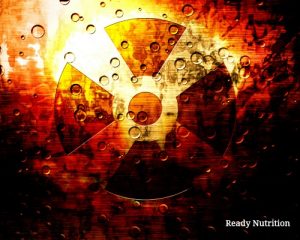
You’d think that after the Fukushima Nuclear Power Plant melted down, the US government would reassess the safety of our own power plants, and take the proper precautions so that we never face a disaster like that. After all, the Japanese government was pretty confident that their power plants were totally safe from natural disasters. No matter how confident we are about the safety of our power plants, we should take a second look at them.
It turns out, however, that our government is not interested in taking the proper precautions. According to scientists, the Nuclear Regulatory Commission is woefully underestimating how much damage our nuclear power plants could cause [1] in the event of a terror attack or natural disaster.
Published by researchers from Princeton University and the Union of Concerned Scientists, the article argues that NRC inaction leaves the public at high risk from fires in spent-nuclear-fuel cooling pools at reactor sites. The pools — water-filled basins that store and cool used radioactive fuel rods — are so densely packed with nuclear waste that a fire could release enough radioactive material to contaminate an area twice the size of New Jersey. On average, radioactivity from such an accident could force approximately 8 million people to relocate and result in $2 trillion in damages.
These catastrophic consequences, which could be triggered by a large earthquake or a terrorist attack, could be largely avoided by regulatory measures that the NRC refuses to implement. Using a biased regulatory analysis, the agency excluded the possibility of an act of terrorism as well as the potential for damage from a fire beyond 50 miles of a plant. Failing to account for these and other factors led the NRC to significantly underestimate the destruction such a disaster could cause.
“The NRC has been pressured by the nuclear industry, directly and through Congress, to low-ball the potential consequences of a fire because of concerns that increased costs could result in shutting down more nuclear power plants,” said paper co-author Frank von Hippel, a senior research physicist at Princeton’s Program on Science and Global Security (SGS), based at the Woodrow Wilson School of Public and International Affairs. “Unfortunately, if there is no public outcry about this dangerous situation, the NRC will continue to bend to the industry’s wishes.“
And that’s not all. It turns out that if a power plant caused all of this damage, the nuclear industry would only be liable for $13.6 billion in damages, due to the Price Anderson Act of 1957. So guess who would get to foot the bill for a multi-trillion dollar disaster? It would be you and me, and every other taxpayer.
As if that wasn’t maddening enough, it turns out that it would be relatively cheap to modify our nuclear power plants to prevent this kind of disaster. A few billion dollars spent nationwide could someday prevent trillions of dollars in damages.
The NRC analysis found that a fire in a spent-fuel pool at an average nuclear reactor site would cause $125 billion in damages [which is a low-ball estimate], while expedited transfer of spent fuel to dry casks could reduce radioactive releases from pool fires by 99 percent. However, the agency decided the possibility of such a fire is so unlikely that it could not justify requiring plant owners to pay the estimated cost of $50 million per pool.
The NRC cost-benefit analysis assumed there would be no consequences from radioactive contamination beyond 50 miles from a fire. It also assumed that all contaminated areas could be effectively cleaned up within a year. Both of these assumptions are inconsistent with experience after the Chernobyl and Fukushima accidents.
Nuclear power was always supposed to be clean, efficient and cheap. But if our government doesn’t make the nuclear industry pay for these safety features, then nuclear power will be none of those things. There’s nothing clean or cheap about a fire that could cost trillions of dollars and contaminate thousands of square miles.
And if the US government isn’t going to force them to do the right thing with regulations, then perhaps they should go the other direction. Perhaps it would be best for the free market to sort out the nuclear industry.
We have to get rid of the law that only leaves this industry liable for a few billion dollars in the event of a disaster, because otherwise, our government and the taxpayers are basically subsidizing their future negligence. If the nuclear industry is worried that essential safety precautions will bankrupt them, then tough. If it wasn’t for that law, they would be forced to either shape up, or go out of business. Those possibilities would make us all a lot safer.
Read More:
The Next Fukushima? These Nuclear Power Plants Reside in Earthquake Zones [2]
PREPARING FOR THE NEXT ATTACK: HOW TO SURVIVE A NUCLEAR MELTDOWN [3]
7 Natural Supplements You Should Have in Case of Nuclear Fallout [4]
What Happens to Nuclear Power Plants Following an EMP? [5]
Advanced Tactical Gas Mask – Are You Ready for a Biological, Nuclear or Chemical Attack? [6]
